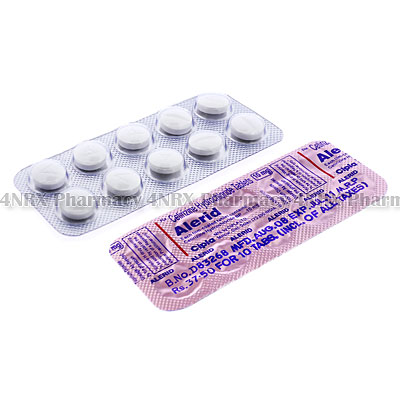 |
Home  Allergies Allergies  Alerid (Cetirizine HCL) Alerid (Cetirizine HCL) |
|
|||||||||
|
|
Alerid (Cetirizine HCL) (se TIR a zeen)
What is Alerid (Cetirizine HCL) used for? Alerid (Cetirizine HCL) is an oral antihistamine used to treat patients suffering from allergy symptoms such as sneezing, runny nose, or watering eyes. It operates by stopping the action of histamines that cause the swelling and irritation caused by allergens. Your doctor may also prescribe its use for the treatment of other unlisted conditions. How should I use Alerid (Cetirizine HCL)? Alerid (Cetirizine HCL) is normally administered once daily at a dosage of one tablet, but your particular instructions will be determined by your doctor based on your health condition and the severity of your symptoms. These should be taken with a large glass of water and may be taken one an empty stomach, although a meal is recommended prior to use if you get an upset stomach. Never change the form of the tablets by splitting or crushing the medication as this may destroy or change the effects of their contents. What are the side effects of Alerid (Cetirizine HCL)? Alerid (Cetirizine HCL) may cause side effects in some patients such as:
Serious side effects that may require emergency medical attention are confusion, hyperactivity, irregular heartbeats, tremors, insomnia, vision problems, or urinary retention. Contact your doctor as soon as you experience any unusual symptoms to make sure the correct adjustments are made to your dosage or application frequency to prevent more health problems from occurring. Please Note Alerid (Cetirizine Hydrochloride) should not be taken by children under two or by patients with severe kidney failure or fructose intolerance. Use caution if you have epilepsy or reduced liver or kidney function as these conditions may require special adjustments to your regiment. Strictly use the medication as prescribed and follow all instructions provided by your doctor. Safe, suitable, and optimum dosage can vary and is dependent on the patient`s health and medical history, as well as the condition you are treating. Alerid (Cetirizine Hydrochloride) may not be safe or suitable for all patients. Always ensure your doctor is informed if you are pregnant or breastfeeding, using any other type of medication (including non-prescription medicine, vitamins, and supplements), as well as if you have any allergies, other illnesses, or pre-existing medication conditions. Seek immediate medical attention or proceed to your nearest accident and emergency department if you suffer a hypersensitive or allergic reaction. Symptoms usually present during a reaction of this nature include difficulty breathing or swallowing, swelling of the limbs or face, tight chest, hives, and skin rashes. 
|
||||||||||||||||||